

Blogs — Mary Myatt Learning. Nobody has deliberately set out to increase workload.
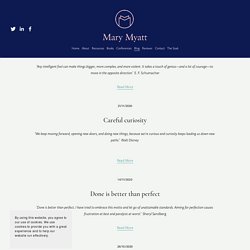
But increased it has. So what can senior leaders do to address the drivers for this and how can they find ways of cutting through anything which is not absolutely necessary? This chapter explores further the three main strands identified in the Government’s Workload Challenge, set out in the previous chapter: planning and resources, data management and marking. Planning First, to planning. The Department for Education’s workload review group on planning and resources identified planning a sequence of lessons as more important than writing individual lesson plans. The most compelling reason for moving away from compulsory daily lesson plans are that not only are they not necessary, they can get in the way of the bigger ‘flow’ of the sequence of learning.
Second, senior leaders might deem it too risky to do away with lesson plans because they believe that they might be needed for an inspection. Data management. Headteachers' standards 2020. Introduction Headteachers are leading professionals and role models for the communities they serve.
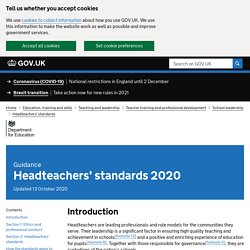
Their leadership is a significant factor in ensuring high quality teaching and achievement in schools[footnote 12] and a positive and enriching experience of education for pupils[footnote 8]. Together with those responsible for governance[footnote 5], they are custodians of the nation’s schools. Parents[footnote 6] and the wider public rightly hold high expectations of headteachers, given their influential position leading the teaching profession and on the young people who are their responsibility. Principled leadership in challenging times Steve Munby 2017. FINAL Pathfinder resource pack 2019 VERSION 3 24.
ELC final report. Ethical Leadership Commission – chartered.college. How ethical leadership pathfinders are using the framework - National Governance Association. At ethicalschools@nga.org.uk we recieve a variety of feedback from pathfinders about their experiencs of using the Framework for Ethical Leaderhship in Education to guide their decision making and to call out unethical practice.
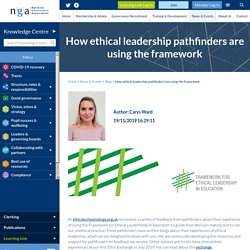
Three pathfinders have written blogs about their experiences of ethical leadership, which we are delighted to share with you. We are continually developing the resources and support for pathfinders on feedback we receive. Other schools and trusts have shared their experiences at our first Ethic Exchange in July 2019. You can read about the exchange. Ethical Leadership in Education - National Governance Association. Ethical Leadership for a better education system “The nation trusts us to form young people into the best that they can be.
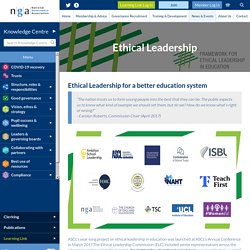
Why we need to ask bigger, bolder and better questions about education. It's time for less dogma, fewer polarised, sterile arguments and the humility to realise how much we can learn from others.
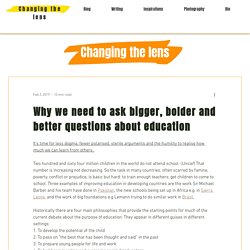
Two hundred and sixty four million children in the world do not attend school. (Unicef) That number is increasing not decreasing. So the task in many countries, often scarred by famine, poverty, conflict or prejudice, is basic but hard: to train enough teachers; get children to come to school. Three examples of improving education in developing countries are the work Sir Michael Barber and his team have done in Pakistan, the new schools being set up in Africa e.g. in Sierra Leone, and the work of big foundations e.g Lemann trying to do similar work in Brazil.
Historically there are four main philosophies that provide the starting points for much of the current debate about the purpose of education: They appear in different guises in different settings: 1. 2. Simon Sinek: How great leaders inspire action. Simon Sinek - Start With Why - TED Talk Short Edited. National Standards of Excellence for Headteachers. Organizational Culture Edgar Schein. Organizational Culture Edgar Schein. Understanding the Kubler Ross Change Curve. Five Dysfunctions of a Team by Patrick Lencioni. Developing a communications strategy — NCVO Knowhow. Step-by-step guide to producing a comms strategy for your organisation.
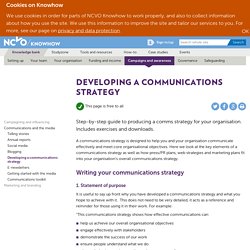
Includes exercises and downloads. A communications strategy is designed to help you and your organisation communicate effectively and meet core organisational objectives. Here we look at the key elements of a communications strategy as well as how press/PR plans, web strategies and marketing plans fit into your organisation’s overall communications strategy. Writing your communications strategy 1. Navigating the educational moral maze. Articles > Don't be a hero - Leader Magazine. Collecting and analysing evidence on what improves student learning outcomes has been my life’s work.
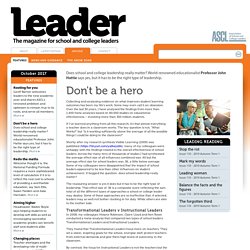
Some may even call it an obsession. Over the last 30 years, I have analysed the findings from more than 1,400 meta-analyses based on 80,000 studies on educational effectiveness – involving more than 300 million students. If I’ve learned anything from all this research, it’s that almost everything a teacher does in a classroom works. The key question is not, “What Works?” But “Is it working sufficiently above the average of all the possible things I could be doing in the classroom?” Shortly after my research synthesis Visible Learning (2009) was published ( many of my colleagues were unhappy with the findings related to the overall effectiveness of school leaders. The reassuring answer is yes it does but it has to be the right type of leadership. Transformational Leaders v Instructional Leaders They found that Transformational Leaders focus more on teachers. Sugata Mitra: Kids can teach themselves. Sir Ken Robinson: Do schools kill creativity?
(82) BOUNCE BY MATTHEW SYED THE MYTH OF TALENT AND THE POWER OF PRACTICE.